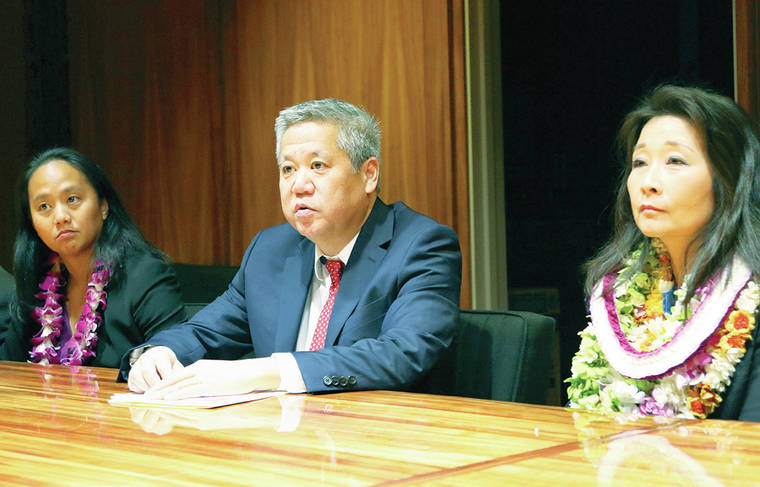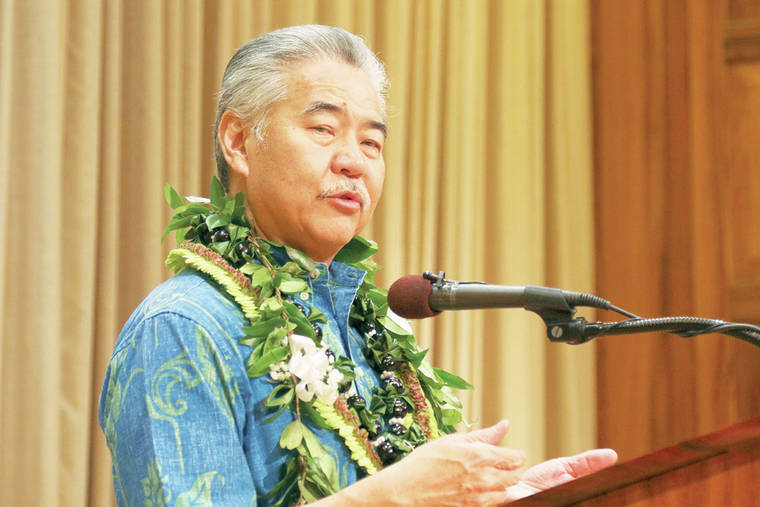Lawmakers vow to address high cost of living in state



HONOLULU — Lawmakers opened a new session of the state Legislature on Wednesday with vows to address the state’s punishingly high cost of living so families don’t have to abandon the islands for cheaper places.
State Rep. Dee Morikawa, a Democrat who represents Niihau, West Kauai and portions of the South Shore, said lawmakers want to bring as many individuals and families out of poverty as possible by lowering the cost of living in Hawaii.
“Although the minimum wage is minimal, the tax relief will be a big help. Providing child care and affordable housing will also help with the cost of living. I’m very excited about what we will try to accomplish, and having the support from both chambers and the administration is huge,” said Morikawa, House majority floor leader.
House Speaker Scott Saiki noted Hawaii’s population has declined for the third year in a row.
“This is something that we take very seriously. It bothers the members of our body to see this happening under our watch,” Saiki told reporters. Lawmakers need to fix problems working families face on a daily basis, he said.
The plans include increasing the minimum wage, making the state’s earned income tax credit refundable, and using state lands to develop leasehold housing. The measures would also expand early childhood education and create a new agency that will oversee major construction projects and repairs at public schools.
The House and Senate Democratic majorities and Gov. David Ige have already agreed to the outlines of the proposals.
Ige acknowledged there was much to still work out, including how the state would find and train enough teachers to instruct thousands more 3- and 4-year-olds. He said bold action is needed.
“Business as usual is not good enough. I think the package is an effort to say ‘we need to get it done,’” Ige told reporters at a news conference.
Rep. Gene Ward, a Republican leading the House minority caucus, said he was glad the majority admitted people were leaving Hawaii and the cost of living was “out of control.” Ward said he hoped Saiki wasn’t overpromising on something he won’t be able to deliver.
Ward said lawmakers need to focus on what fuels a robust economy and grow the economy instead of just “cutting it in pieces.” He also expressed concern at how the state would pay for the initiatives.
“Show us the money that we can afford to do that,” Ward said.
Senate President Ron Kouchi, who represents Kauai and Niihau, said lawmakers have been criticized over the years for agreeing on measures so late in the session there’s not enough time for public input. Kouchi said he hoped presenting ideas early will include more people in discussions.
“We are hoping to create a more transparent process. We are hoping to create a process that is going to engage our community,” Kouchi said during remarks on the Senate floor.
State Rep. Nadine Nakamura, a Democrat who represents the North Shore and portions of the Eastside of Kauai, said she is “excited about the bold proposals to bring tax relief to working families in Hawaii.”
“Increasing the minimum wage, making the earned income tax credit refundable, and increasing the food tax credit is a historic package that eases the high cost of living in Hawaii,” she said. “I will continue to work on traffic-relief measures and affordable-housing funding.”
The measures respond in part to problems highlighted in a report sponsored by Aloha United Way showing that half of Hawaii’s residents struggled to make ends meet.
The study found 37% of Hawaii’s population have jobs yet can’t afford basic necessities to remain stable and self-sufficient. Another 11% of households live below the federal poverty level.
Opponents of the Thirty Meter Telescope’s construction on Mauna Kea brought their protest to the Capitol rotunda, chanting the slogan “Ku Kia‘i Mauna” and listening to speeches.
Kaho‘okahi Kanuha, a protest leader, said he wanted to “remind this building that times are changing in Hawaii.”
“The years of just running Hawaiians over and pushing them out however they wish … those days are over. We’re not going to allow it. And we’re going to organize, and we’re going to make sure that we can pass on our home to our keiki. And that they can recognize it as our home,” Kanuha said.

Repeal the Jones Act. Problem solved.
Let’s play the broken record again……if you can’t afford to live here, then you should plan to leave as soon as practical to a lower cost of living and better job opportunities.
I want to live in major metropolitan cities but can’t afford to drop $1M for a condo. Stop the madness!
Here’s what this article is missing.
Even if the population numbers stabilize like the politicians want, that fact is that malahines are replacing kamaainas. Many new malahine “residents” arrive with lots of money and can easily afford a Kauai residence. Some don’t even need to work at all.
Local residents have a hard time keeping land in the family. Parents usually pass on their house to their kids. The kids typically have new families and they all can’t practically fit in the house they grew up in. In many cases the value of the house prohibits even one of the kids from buying out the others, so it is sold.
Try solving that problem.
Without a solid economy providing jobs we’ll probably see more and more kamaainas forming Hawaiian Clubs in Vegas, Oregon, etc.
Ron,
Raising the minimum wage will negate any positive effects you foresee.
Being able to purchase a dozen more eggs each week won’t solve any problem.
Dump the minimum wage, focus on business-creation incentives, be imaginative & bold braddah!
What a perfect fraud this is. The very people-politicians-responsible for making Hawaii one of the least affordable places to live and who are openly antagonistic to businesses (you know the source of all productive employment) now claim they want to fix it? What a load of manure this is.
And what are some of their solutions? Spending more taxpayer money? This is typical of these economically ignorant people. Spending more & increasing regulations mean, ultimately, higher taxes which make the problem they’re trying to fix WORSE.
These economic half-wits need to get out of the way. Reduce regulations and taxes; focus on what they should–better roads, etc.–and stopping all the wasteful spending on feel-good programs that accomplish nothing, except to dis-incentivize people from being responsible for their own lives.
This is just disgusting, but so typical of the brain-dead politicians across the board.
RG DeSoto
Is this the way they propose to reduce the cost of living in Hawaii??
http://www.hawaiifreepress.com/ArticlesMain/tabid/56/ID/24717/State-spending-cap-is-useless.aspx?utm_source=Copy+of+January+12%2C+2020+News+from+HawaiiFreePress++&utm_campaign=January+12%2C+2020+Email+9am&utm_medium=email
RG DeSoto
Early Childhood Education is just another word for government funded day care. Taxes go up and more public union jobs.
Start with their own salaries, property taxes, insurance,, work for welfare and food stamps, no more government worker pay raises, private workers are getting any.,